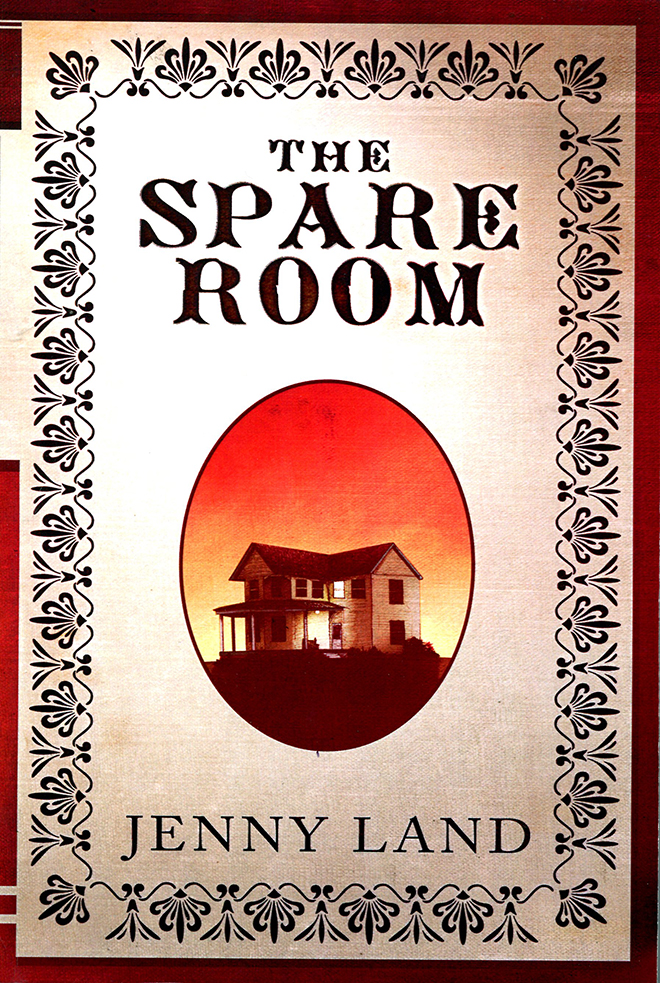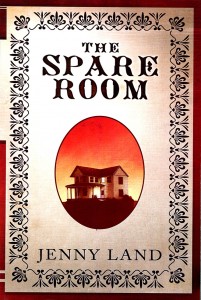
 copyright the Chronicle 10-31-12
copyright the Chronicle 10-31-12
Reviewed by Tena Starr
The Spare Room, by Jenny Land. Published by Voyage, St. Johnsbury, Vermont. Paperback. 211 pages. $14.95.
Author Jenny Land, a St. Johnsbury Academy English teacher who lives in Peacham, has put a refreshing new twist on the familiar tale of an escaped Southern slave headed north to freedom. The Spare Room pays scant attention to the Underground Railroad and Vermont’s part in it and tells the story, instead, of what it might have been like to be a black man in northern New England in 1943.
Jacob is, indeed, an escaped slave. He does spend time in Vermont, although his ultimate goal is Canada. But he’s not hiding in secret rooms, constantly fearing detection. He’s not even particularly worried about recapture. Jacob is in Vermont to work for the narrator’s family. The neighboring farmer, Mr. MacLeish, has been injured, and both farmers are in bad need of help.
It quite unexpectedly arrives in the form of Jacob, a black man in his thirties, who the town does not know what to make of. He’s treated with kindness by some, outright hostility by others, and with caution by many. Mr. MacLeish prohibits his daughter Kate from being around him alone.
The book is written in diary form by narrator Susannah, a girl who comes across as articulate, idealistic, and very real. She’s a 12-year-old with girlfriend tiffs, awkward romances, and an attraction to adventure. She’s also a practical farm girl who sighs over the tedium of washing her siblings’ diapers and making tallow candles. She’s awed when listening to Frederick Douglas make a speech in Montpelier, horrified when anti-abolitionists throw rotten fruit at her and Jacob, and both mystified and angry when her southern teacher gives her a bad grade for arguing against slavery. He says the logic of the moral rationale is unsound.
Near the end of the story, tragedy results from the town’s ideological and emotional conflicts over race and slavery. Also, the reader finally understands why Jacob has been lingering in Vermont even though tensions have been running too high for him to continue working, and freedom is not far away on the other side of the border.
This is a story about pre-Civil War Vermont, the role the state played in the abolitionist movement, and the difficulties so many people faced, even within families, sorting out their thoughts and behavior when faced with an actual black person in their midst.
It’s also a very competent record of farm life at that time. I was initially taken aback when Susannah talked about their Merino sheep rather than their cows.
But of course. Vermonters were sheep farmers at that time; dairying came along later. Susannah and her family slaughter animals, weed a huge garden, preserve food, spend hours cooking, chop wood, travel very slowly via horse to wherever they need to go, worry intensely when a child is to be born or gets croup, and don’t read or write much in the evening when it’s finally dark and too late to do more chores because they worry about rapidly using their limited supply of candles.
Ms. Land doesn’t make much fuss about all this; she simply incorporates this fine account of day-to-day farm life into Susannah’s record. It’s a well-written book, and an interesting one, with a little mystery, realistic characters, a moral core, and a sweet understanding of young people coming of age.
But what I liked best about this story is that it wasn’t the one I thought it was going to be. Important as the Underground Railroad was, it’s a story that most young people are familiar with. This one — the story of a man hiding in plain sight — was much more compelling. Jacob’s presence brings out the best and worst in people, and at the very least forces them to examine their own ideology — and nature.
In an author’s note, Ms. Land says that she earlier had written a more conventional Underground Railroad story about a family taking in an escaped slave and hiding him in a secret room.
“However, when I visited the Rokeby Museum in 2001, I realized that I’d been writing a story that would have been far more likely to have occurred in a state to the south of Vermont, where secrecy played a much more important role in the success of a slave’s quest for freedom,” she writes. “I learned that by the time a slave reached the remote northern hills of Vermont, as noted by Susannah in her diary, a slave was much less likely to be chased by an overseer or returned to the South. By the time a slave reached Vermont, like Jacob, he could take a much more active role in his livelihood and transition into a life of freedom.”
The Rokeby Museum in Ferrisburgh is one of the best-documented Underground Railroad sites in the country and is a National Historic Landmark.
The Spare Room is written for adolescents, but it’s an enlightening and entertaining read for both younger and older.
contact Tena Starr at [email protected]
For more free articles from the Chronicle like this one, see our Reviews pages. For all the Chronicle’s stories, pick up a print copy or subscribe, either for print or digital editions.







